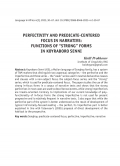Koyraboro Senni (KS), a Malian language of Songhay family, has a system of TAM markers that distinguish two aspectual categories – the perfective and the imperfective and three series – the “weak” series used in neutral declarative clauses and clauses with a non-subject focus, the subject-focus series, and the “strong” series, which is used for predicate-centered focus. The paper studies the use of the strong in-focus forms in a corpus of narrative texts and shows that the strong perfectives in most cases are used to describe real events, while strong imperfectives are irrealis-oriented. Contrary to implications of our current knowledge of polyfunctionality of in-focus forms the strong imperfective is not used for present progressive and is relatively frequent in narrative texts. I also argue that while the perfective part of the system is better understood as the result of development of typical intrinsically-focused reading – the perfect, its imperfective part is better explained in line with Tatevosov’s (2005) proposal of direct development of the habitual to the prospective.
